Books
Books

Emil Lime
Emil Lime collects various materials that nurture and give shape to Esther Gatón’s artistic practice, including collages made with her phone pics, sketches, sporadic notes and drawings, together with the writing of authors that have been influential on the work: Fredy Massad, María Fernanda Ampuero, Darya Diamond and Cory John.

The Long Form
The Long Form is the story of two people composing a day together. It is a day of movements and improvisations, common and uncommon rhythms, stopping and starting again. As the morning progresses, a book – The History of Tom Jones by Henry Fielding – gets delivered, and the scope of the day widens further. Matters of care-work share ground with matters of friendship, housing, translation, aesthetics and creativity. Small incidents of the day revive some of the oldest preoccupations of the novel: the force of social circumstance, the power of names, the meaning of duration and the work of love. With lightness and precision, Kate Briggs renews Henry Fielding’s proposition for what a novel can be, combining fiction and essay to write an extraordinary domestic novel of far-reaching ideas.
Kate Briggs grew up in Somerset, UK, and lives and works in Rotterdam, NL, where she founded and co-runs the writing and publishing project ‘Short Pieces That Move’. She is the translator of two volumes of Roland Barthes’s lecture and seminar notes at the Collège de France: The Preparation of the Novel and How to Live Together, both published by Columbia University Press. The Long Form follows This Little Art, a narrative essay on the practice of translation. In 2021, Kate Briggs was awarded a Windham-Campbell Prize.
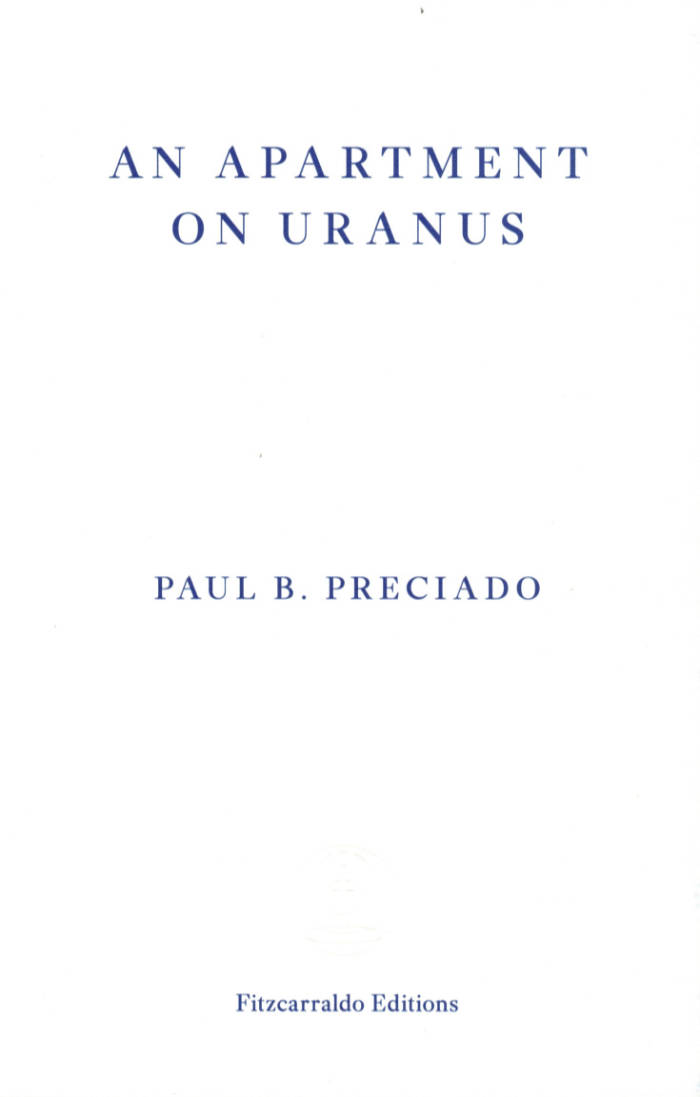
An Apartment on Uranus (Uk edition)
Uranus is the coldest planet in the solar system, a frozen giant named after a Greek deity. It is also the inspiration for Uranism, a concept coined by the writer Karl Heinrich Ulrichs in 1864 to define the ‘third sex’ and the rights of those who ‘love differently’. Following in Ulrichs’s footsteps, Paul B. Preciado dreams of an apartment on Uranus where he can live, free of the modern power taxonomies of race, gender, class or disability.
In this bold and transgressive book, Preciado recounts his transformation from Beatriz into Paul B., and examines other processes of political, cultural and sexual transition, reflecting on socio-political issues including the rise of neo-fascism in Europe, the criminalization of migrants, the harassment of trans children, the technological appropriation of the uterus, and the role artists and museums might play in the writing of a new social contract. A stepchild of Michel Foucault and Judith Butler, Preciado argues, with courage and conviction, for a planetary revolution of all living beings against the norm.

King Kong Theory (Uk edition)
Powerful, provocative and personal, King Kong Theory is a candid account of how the author of Baise-moi came to be Virginie Despentes. Drawing from personal experience, Despentes shatters received ideas about rape and prostitution, and explodes common attitudes towards sex and gender. King Kong Theory is a manifesto for a new punk feminism, reissued here in a brilliant new translation by Frank Wynne.
‘I write from the realms of the ugly, for the ugly, the frigid, the unfucked and the unfuckables, all those excluded from the great meat market of female flesh, and for all those guys who don’t want to be protectors, for those who would like to be but don’t know how, for those who are not ambitious, competitive, or well-endowed. Because this ideal of the seductive white woman constantly being waved under our noses – well, I’m pretty sure it doesn’t exist.’
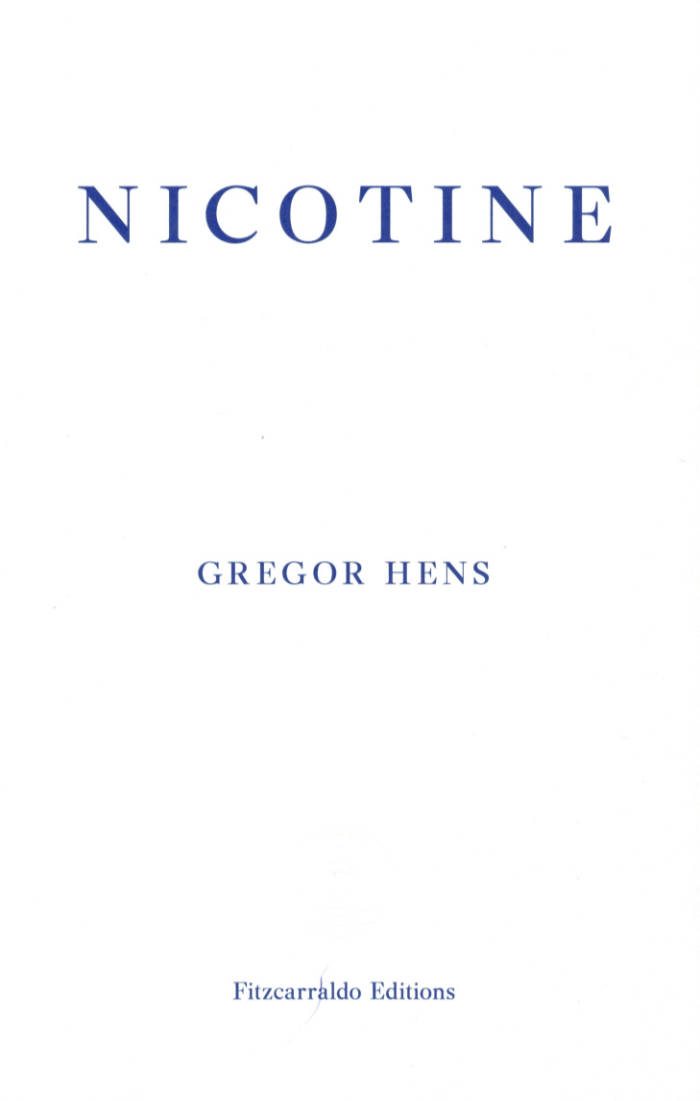
Nicotine
The translation of this work was supported by a grant from the Goethe-Institut which is funded by the German Ministry of Foreign Affairs
Written with the passion of an obsessive, Nicotine addresses a life of addiction, from the epiphany of the first drag to the perennial last last cigarette. Reflecting on his experiences as a smoker from a young age, Gregor Hens investigates the irreversible effects of nicotine on thought and patterns of behaviours. He extends the conversation with other smokers to meditations on Mark Twain and Italo Svevo, the nature of habit, the validity of hypnosis, and the most insignificant city in the United States, where he lived for far too long. With comic insight and meticulous precision, Hens deconstructs every facet of the dependency and offers a brilliant disquisition on the psychopathology of addiction.
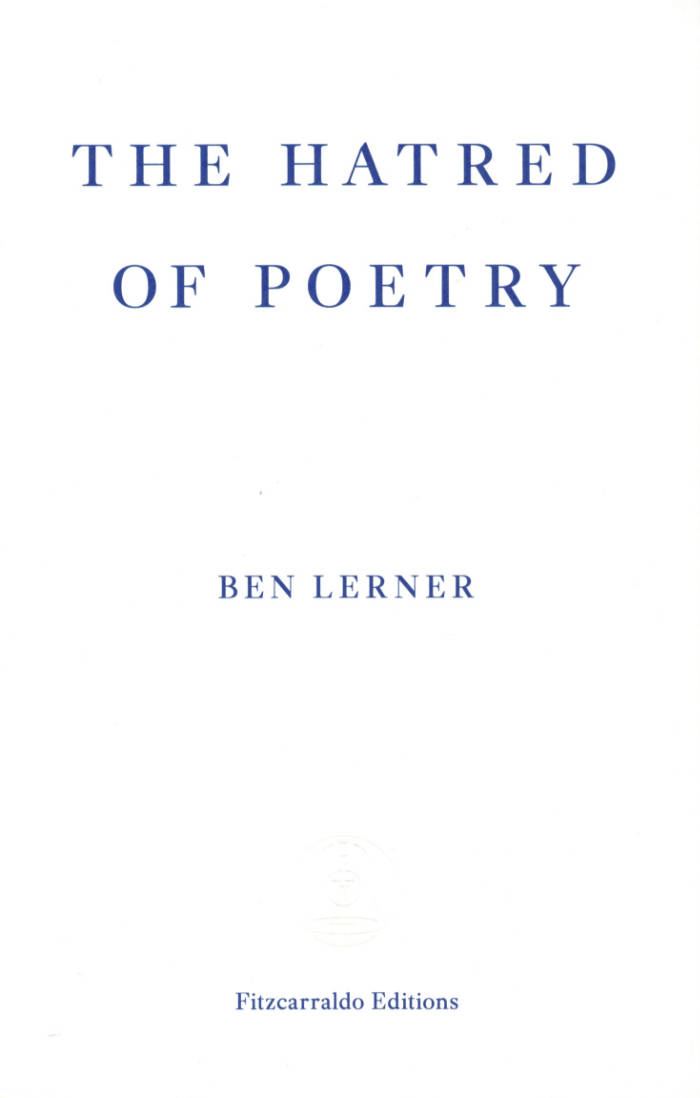
The Hatred Of Poetry
No art has been denounced as often as poetry. It’s even bemoaned by poets: ‘I, too, dislike it,’ wrote Marianne Moore. ‘Many more people agree they hate poetry,’ Ben Lerner writes, ‘than can agree what poetry is. I, too, dislike it and have largely organized my life around it and do not experience that as a contradiction because poetry and the hatred of poetry are inextricable in ways it is my purpose to explore.’
In this inventive and lucid essay, Lerner takes the hatred of poetry as the starting point of his defence of the art. He examines poetry's greatest haters (beginning with Plato’s famous claim that an ideal city had no place for poets, who would only corrupt and mislead the young) and both its greatest and worst practitioners, providing inspired close readings of Keats, Dickinson, McGonagall, Whitman, and others. Throughout, he attempts to explain the noble failure at the heart of every truly great and truly horrible poem: the impulse to launch the experience of an individual into a timeless communal existence. In The Hatred of Poetry, Lerner has crafted an entertaining, personal, and entirely original examination of a vocation no less essential for being impossible.

The Films of Laura Mulvey and Peter Wollen
This collection of Laura Mulvey and Peter Wollen's film scripts vividly evokes the close connection between their influential work as theorists and their work as filmmakers. It includes scripts for all six of Mulvey and Wollen's collaborative films, Wollen's solo feature film, Friendship's Death (1987), and Mulvey's later collaborations.
Each text is followed by a new essay by a leading writer, offering a critical interpretation of the corresponding film. The collection also includes Wollen's short story Friendship's Death (1976), the outlines for two unrealised Mulvey and Wollen collaborations, and a selection of scanned working documents. The scripts and essays collected in this volume trace the historical significance of a complex cinematic project that brought feminist, semiotic and psychoanalytic concerns together with formal devices and strategies.
The book includes original contributions from Nora M. Alter, Kodwo Eshun, Nicolas Helm-Grovas, Esther Leslie, Laura Mulvey, Volker Pantenburg, Griselda Pollock, B. Ruby Rich and Sukhdev Sandhu.

IN THE BAG
Published as a precursor to BFTK#6, ‘In the Bag’ by Paul Buck is a pamphlet / essay / missive about rarities, the out of print, one-offs and those ‘oddities, oddments and ornaments’ that collectors and magpies seek, hoard and lose. Printed and numbered in an edition of 150, each copy comes with a violet insert featuring a photograph of a Gladstone bag by Valentine Day.

BRICKS FROM THE KILN #5
Andrew Walsh‐Lister, Matthew Stuart
Bricks from the Kiln is a semi-yearly journal and multifarious publishing platform established in mid-2015 to support critically minded and explorative writing on and around art, design and literature. Edited by Matthew Stuart and Andrew Walsh-Lister, the forthcoming issue, number five, begins with a single sentence:
blankets topologies in glistening snow and blood — produces instructional spattering, again and again — coughs up clotted network diagram hairballs of illegibility — parasitically draws on / from Thomas Browne’s quincunx — meets for The Big ROAR tomorrow, yesterday — lifts loud cows off the page, aloud — flips the coin of language, heads or tails? — politely speaks on writing heard yet seen — twists tongues, transliterates and teases — makes contact with ancestral spirits — traverses the foothills of La Marquesa, past and present — is the Spectre at the feast — (re)traces polymorphous concrete poems — dashes, gestures, speaks, breathes, moves, joyness — is, as ever, tentative, incomplete and inconsistent.
Contributions by Helen Marten, Rebecca May Johnson, Johanna Drucker, Louis Lüthi, Daisy Lafarge, Holly Pester, Ursula K. Le Guin, Quinn Latimer, Stefan Themerson, Slavs and Tatars, Ashanti Harris, Catalina Barroso-Luque, Kevin Lotery, Bronac Ferran with Greg Thomas and Astrid Seme with Alex Balgiu.

BFTK #6: Tentative — Incomplete — Inconsistent
Andrew Walsh‐Lister, Matthew Stuart
This instalment of Bricks from the Kiln doubles as issue #6 of the journal and as an exhibition catalogue for the thematic show ‘BFTK#6: Tentative — Incomplete — Inconsistent: A Catalogue of the Disappeared, Destroyed, Lost or Otherwise Inaccessible’. Presenting objects, artworks, artefacts, models, events and animals that no-longer — or never did — exist in physical form, the exhibition explores themes of death, destruction and reincarnation, examining persisting interests in notions of ephemerality and permanence, memory and record, preservation and erasure, creation and reconstruction.
How do we remember and memorialise? How is space given to the unrecorded? How do we experience the out of reach, concealed, unseen, undiscovered? How can the dematerialised be materialised again, through the mediation of writing, image and sound?
THE ALMOST HORSE
Helen Marten
(inside front / back cover)
‘STILL IN ALL HEARTS, IN ALL BELLIES, IN ALL TOES’:
A BELATED REVIEW OF FESTIVAL DE FORT BOYARD
Matthew Stuart & Andrew Walsh-Lister
(pp.6–8)
EDDYSTONE
Rachael Allen
(pp.11–18)
TO MAKE THE STONE STONY
Emily LaBarge
(pp.21–26)
WHEREFORE AM I NOW?
Lucy Mercer
(pp.29–40)
WESTON: THE TOWN THAT WAS, AND THEN WASN’T
Crystal Bennes
(pp.43–52)
NOTES TO ACCOMPANY VIOLENT INNOCENCE (2019)
Will Harris
(pp.55–64)
GHOST, POCKETS, TRACES, NECESSARY CLOUDS
Matthew Stuart
(pp.66–69)
CONNECTIVITY OF TOUCHING
Ali Na & Mindy Seu in conversation
(pp.71–76)
PEARL
Rose Higham-Stainton
(pp.79–84)
NOTES FROM NEW MEXICO
Jennifer Hodgson
(pp.87–98)
THE MOOG OF AHMEDABAD
Paul Purgas
(pp.101–108)
IN WHICH DECIBELLA ESCAPES AUDITION
Sarah Hayden
(pp.111–122)
D.C.B.: A PARTIAL RETROSPECTIVE
Juliet Jacques
(pp.125–136)
PINBALL REMAINS: ON THE PINBALL ISSUE OF THE SITUATIONIST TIMES
Ellef Prestsæter
(pp.139–150)
TOMB III – CADMIUM (2021)
Gilbert Again
(pp.152–154)
NON-DESCRIPT ANIMAL
David Hering
(pp.157–161)
Cover & Bookmark artwork by Helen Marten

Black Revelry: In Honor of ‘The Sugar Shack’
An experiment in book making, which takes up the form of the LP record as a starting point for re-configuring the haptics of the printed book. Presented as a collection of unbound pages inside a gatefold record sleeve, the publication includes a pressed record, as well as written, visual and sonic contributions from scholars, poets, artists, choreographers and DJs.
Through the logic of the detail, each contributor imaginatively (re)produces Ernie Barnes’s iconic painting The Sugar Shack as an archive of personal histories and a universe of intergenerational connections. Held together as an album, it is a performance to be made at home, which invites readers/listeners to feel art’s histories and to be in them with their bodies.
d.a. carter with contributions by Taylor Renée Aldridge; Samiya Bashir; La Marr Jurelle Bruce; DJ Lynnée Denise, Jennifer Harge, Duane Lee Holland, Jr., William H. Mosley, III, Zoé Samudzi, S*an D. Henry-Smith, Melanie Stevens and Phillip B. Williams.

Matt Mullican’s Pure Projection Landscapes
Since the late 1970s Matt Mullican has developed a practice of performing under hypnosis that extends from his investigations into representation and subjective projection, and from his efforts to “enter the image” and embody a fictional character, a body of work that offers an exceptional perspective on repetition and renewal in performance practice.
This book is the outcome of an extensive research project into Mullican’s hypnosis performances, undertaken within the frame of If I Can’t Dance’s Performance in Residence programme with invited researcher Vanessa Desclaux, and a two-day Class of Masters with Mullican on character construction. Desclaux takes up the question of personification in light of her analysis of Mullican’s hypnosis performances. A selection of Mullican’s photographs and works on paper are reproduced in this book.
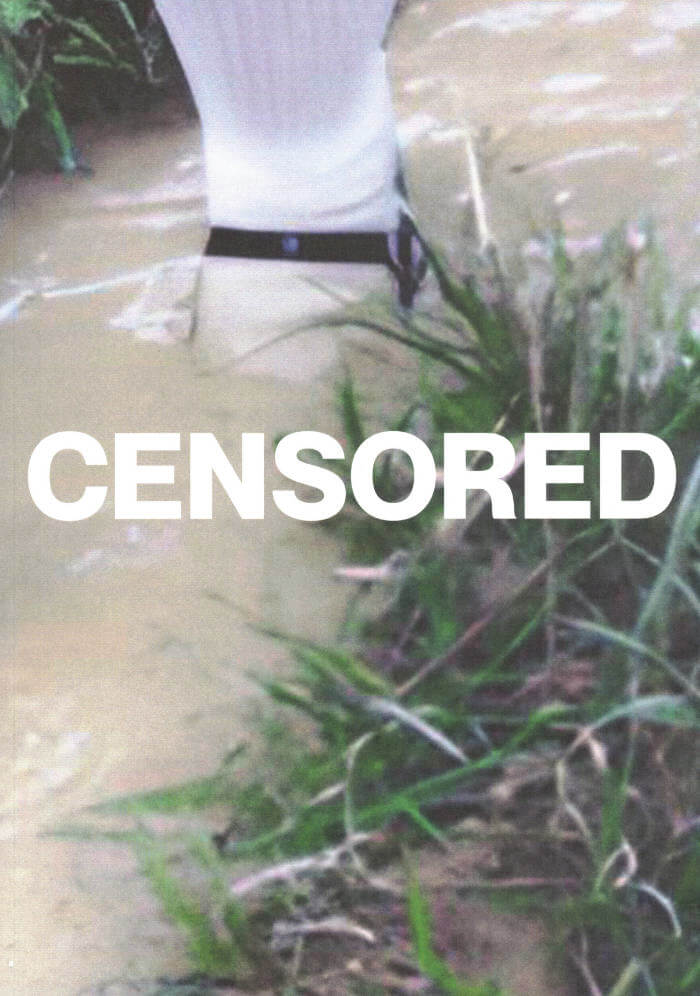
Apocalypticotrashecocidocious - Censored 08
« Apocalypticotrashecocidocious », l’édition Censored 08, parle d’écologie et de luttes anticapitalistes, de vivant et d’humilité
Ses recherches, textes et productions artistiques mènent à une conclusion : l’urgente nécessité de faire front commun pour quitter les logiques d’exploitation hyperviolentes envers la terre, les espèces, les femmes, minorités de genre et personnes racisées. Politiser le rapport que nous entretenons à nos territoires mutilés, qu’ils soient urbains ou ruraux. Comprendre comment le capitalisme s’est érigé en culte quasi religieux fondé sur la dépossession des savoirs, le déracinement des émotions, l’anti-spiritualité et l’individualisme. Il est alors question de militances joyeuses et du refus de la fatalité, de relations inter-espèces, de spiritualités noires, d’écologie au quotidien, de culture white trash et de futurs possibles.
Comment penser l’écologie lorsque c’est notre propre mode d’existence qui parasite le vivant ? Qu’apprendre des mammifères marins ou des espèces invertébrées ? Quels arts, récits et spiritualités pour aller au-delà des imaginaires dystopiques féministes et engendrer l’action ? Comment s’organiser collectivement tout en apprenant à rester à sa place et sans hiérarchiser ?

L'Écriture de Monique Wittig À La Couleur De Sappho
Invitation au voyage à travers l’œuvre littéraire de Monique Wittig, ce livre nous embarque dans une passionnante exploration de ses textes de fiction, de L’opponax à Virgile, non. Il rend compte de la lutte amoureuse qu’elle livre au langage – matériau brut qu’elle travaille au corps pour faire advenir dans la réalité ce qui n’y a pas (encore) droit de cité. La convocation malicieuse et grave des grands récits du passé, les nombreux emprunts aux auteurs anciens, la pratique de la citation font des Guérillères une formidable épopée féministe, du Corps lesbien un Évangile selon Sappho, du Voyage sans fin le combat drôle et tragique d’une Quichotte féministe et lesbienne.
En soulignant la cohérence des textes et leur fragmentation, Catherine Écarnot met en évidence la passion poétique qui habite ces livres que Wittig concevait comme des « chevaux de Troie » : des machines de guerre destinées à fissurer la réalité pour y inscrire une subjectivité mouvante, échappée du continent noir de la féminité, rétive aux assignations de genre. Uniques et radicalement disruptives, les fictions ainsi créées ouvrent grands les chemins qui relient littérature et lesbianisme.
Publié pour la première fois en 2002, cet ouvrage, le premier consacré en Europe à l’œuvre witigienne, reparaît dans une nouvelle édition remaniée, actualisée et enrichie de nombreuses références aux études publiées depuis sa parution.

Art et production
Art et production de Boris Arvatov fait partie des classiques oubliés des avant-gardes qui se sont épanouies durant la Révolution russe. Publié à Moscou en 1926, il vient porter le fer dans les débats qui agitent l’école constructiviste : que doit être le statut de l’art après la révolution, ses liens avec les techniques industrielles de reproduction, avec la critique de la vie quotidienne, comment doit-il entrer dans l’usine ? Autant d’interrogations radicales, témoignages d’une séquence politico-sociale bouillonnante. Une nouvelle conception de l’art émerge, qui laissera une empreinte indélibile sur une tradition de critiques matérialistes de la culture, de Walter Benjamin à Peter Bürger, en passant par Fredric Jameson, celle qui posera la question de l’articulation entre pratique artistique et logiques propres à la sphère de la production. Un document exceptionnel enrichi d’illustrations, paraissant en français pour la première fois, une porte prviliégiée sur un moment-clé de la modernité exthétique du XXe siècle.
Boris Arvatov (1896–1940) est un artiste et critique d’art russe. Il est notamment connu comme théoricien du productivisme, un mouvement d’avant-garde post-révolutionnaire lié au constructivisme.

Logique Du Genre
Qu’est-ce que le genre dans le capitalisme contemporain ? C’est à cette question qu’invite à répondre ce recueil, à partir d’une démarche théorique inspirée du féminisme et du marxisme. Il s’agit de penser, depuis une analyse systématique du rôle joué par le travail domestique et les violences de genre dans notre système économique, un monde au-delà de l’exploitation, et donc du genre et des ses contraintes. Un communisme au présent, qui s’empare de tous ces questionnements, trop souvent ignorés dans l’histoire du mouvement ouvrier.
Jeanne Neton et Maya Gonzalez participent à la revue anglo-américaine Endnotes, dont le présent volume constitue la première traduction française. Elles se placent dans la lignée du féminisme autonome italien (on songe à Silvia Federici, Leopoldina Fortunati ou Mariarosa Dalla Costa) pour proposer une contribution originale et stimulante.
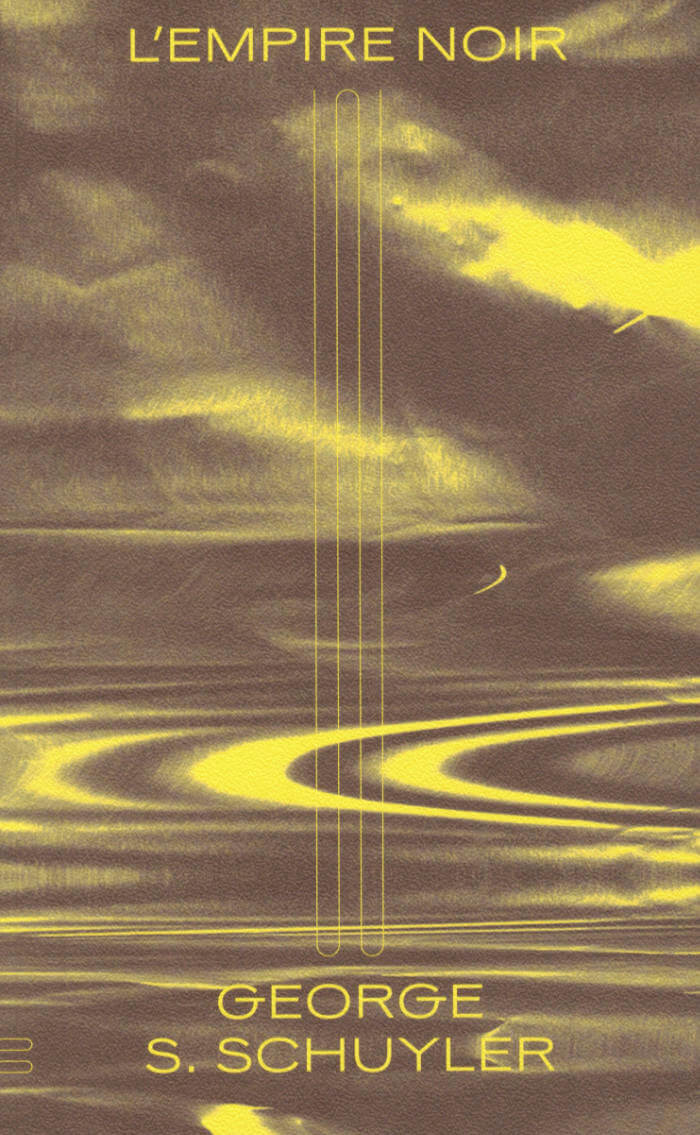
L'Empire Noir
Après une campagne militaire fulgurante, l’organisation secrète du redoutable Dr Belsidus a chassé les puissances occupantes du sol africain et s’est rendue maitre de l’ensemble du continent, unifié pour la première fois en un gigantesque empire. L’expansion a démarré et l’édification d’une civilisation d’un genre inédit est en marche. Mais les nations européennes, après s’être fait la guerre, s’apprêtent à revenir. Une course s’engage entre l’Internationale noire et les appétits impérialistes : sabotages, espionnage, guerre technologique ou bactériologique, les héros et héroïnes de L’Internationale noire né reculeront devant rien pour sauvegarder cette indépendance acquise de haute lutte.
Dans ce second volet du roman-feuilleton qui fit la réputation de G. Schuyler, retrouvez les nouvelles aventures de nos personnages, dorénavant contraints à une lutte géopolitique d’une ampleur inégalée, pour garantir à leur Empire noir un avenir radieux !
George Samuel Schuyler, 1895–1977, fut un essayiste, journaliste et romancier de première importance dans le monde culturel africain-américain de l’entre-deux-guerres. Il reste connu pour la férocité de ses critiques. Il est l’auteur d’un seul roman, Black No More, traduit en France en 2016 et d’un essai romancé dénonçant la traite au Liberia, produit de son enquête de terrain dans le pays. Proche des courants socialistes jusqu’à la Seconde Guerre mondiale, il prendra un virage nettement réactionnaire par la suite, tout en demeurant dans les mémoires de toute une génération d’écrivains, tels qu’Ishmael Reed ou Samuel Delany.
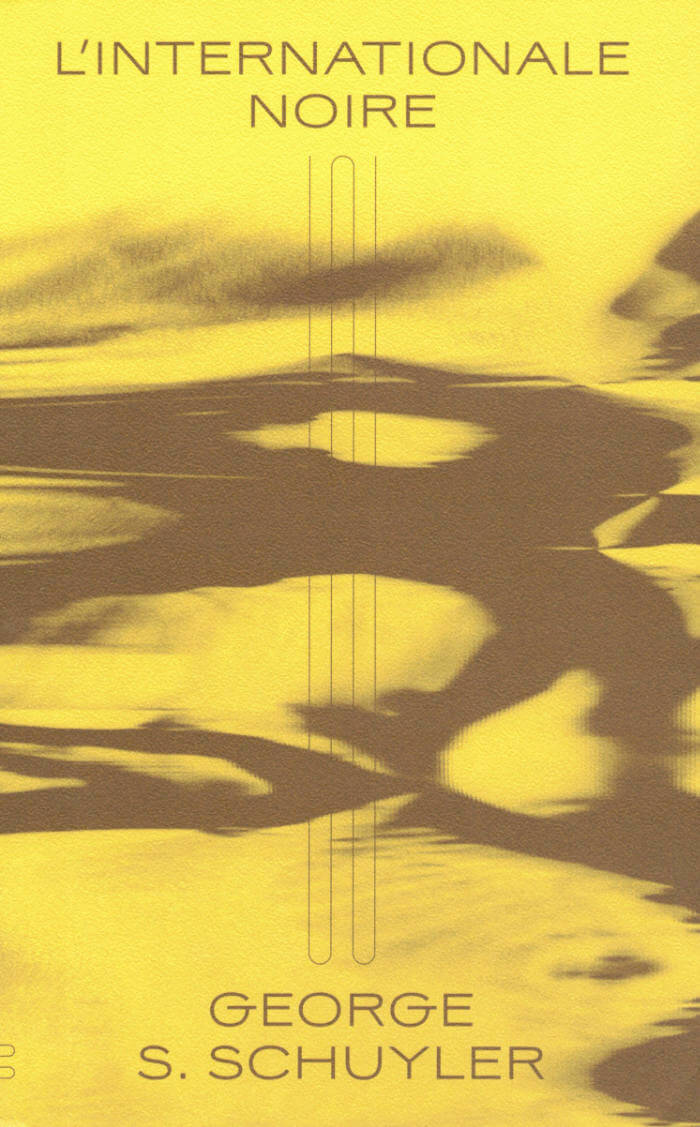
L'Internationale Noire
Années 1930. L’Afrique est sous la férule des puissances impérialistes européennes et la domination blanche s’est étendue à toute la planète. C’est sans compter avec la conspiration tramée par la diabolique Dr Belsidus : son organisation, véritable machine de guerre savamment bâtie grâce aux cerveaux noirs les plus ingénieux, composée d’hommes et de femmes sur tous les continents résolus à mener une lutte sans merci et sans répit, se prépare à changer la face du monde en donnant à l’Histoire un tournant imprévu. Nous voilà embarqués au coeur de l’action avec le journaliste Carl Slater, recrue malgré lui de la redoutable Internationale noire.
Avec ce roman-feuilleton fortement mêlé de science-fiction, George Schuyler, figure éminente de la Harlem Renaissance, explorait dès 1936 les thématiques d’une guerre de libération des peuples de couleur aux dimensions planétaires, et la constitution d’un empire africain. À travers les aventures proprement rocambolesques de ses personnages et l’utilisation de toutes les ficelles du genre, il donna naissance à une satire troublante, un objet littéraire encore non identifié qu’on renconnaîtra plus tard comme un des précurseurs de l’afrofuturisme.
George Samuel Schuyler, 1895–1977, fut un essayiste, journaliste et romancier de première importance dans le monde culturel africain-américain de l’entre-deux-guerres. Il reste connu pour la férocité de ses critiques. Il est l’auteur d’un seul roman, Black No More, traduit en France en 2016 et d’un essai romancé dénonçant la traite au Liberia, produit de son enquête de terrain dans le pays. Proche des courants socialistes jusqu’à la Seconde Guerre mondiale, il prendra un virage nettement réactionnaire par la suite, tout en demeurant dans les mémoires de toute une génération d’écrivains, tels qu’Ishmael Reed ou Samuel Delany.

La Volonté de Changer
Si pour beaucoup d’hommes, le féminisme est une affaire de femmes, bell hooks s’attelle ici à démontrer le contraire. La culture patriarcale, pour fabriquer de « vrais hommes », exige d’eux un sacrifice. Malgré les avantages et le rôle de premier choix dont ils bénéficient, ces derniers doivent se faire violence et violenter leurs proches pour devenir des dominants, mutilant par là-même leur vie affective. La volonté de changer est un des premiers ouvrages féministes à poser clairement la question de la masculinité. En abordant les préoccupations les plus courantes des hommes, de la peur de l’intimité au malheur amoureux, en passant par l’injonction au travail, à la virilité et à la performance sexuelle, bell hooks donne un aperçu saisissant de ce que pourrait être une masculinité libérée, donc féministe.
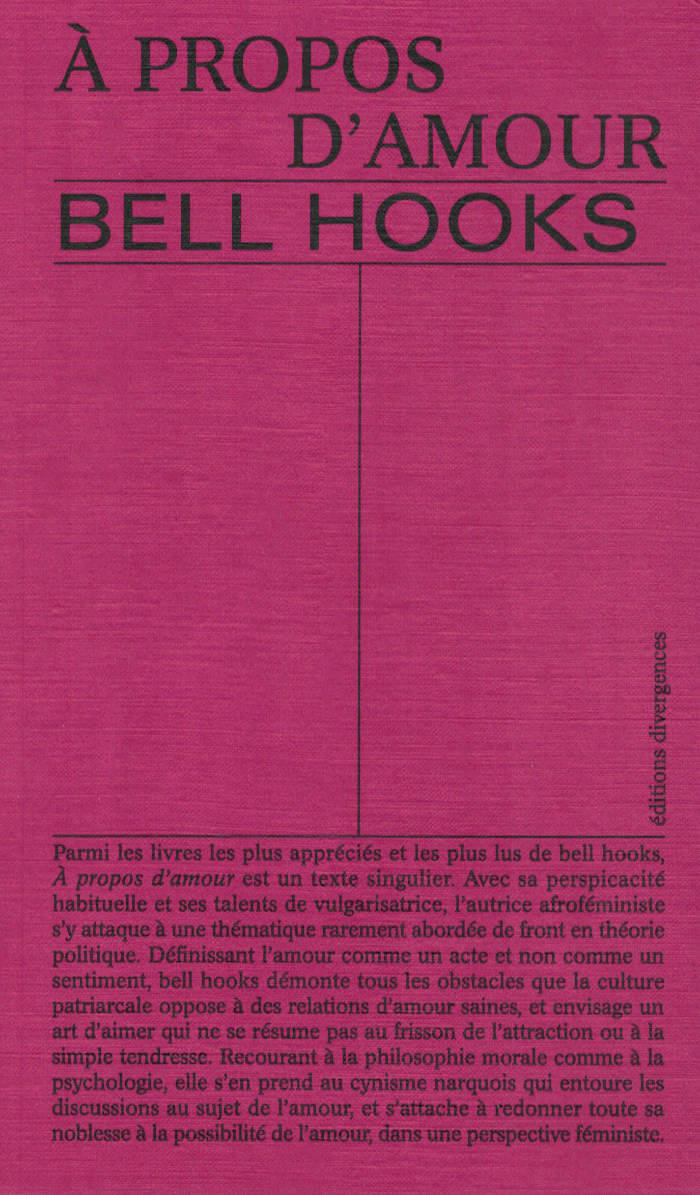
À Propos D'Amour
Parmi les livres les plus appréciés de bell hooks, À propos d’amour est un texte singulier. Avec sa perspicacité habituelle et ses talents de vulgarisatrice, l’autrice afroféministe s’y attaque à une thématique rarement abordée de front en théorie politique. Définissant l’amour comme un acte et non comme un sentiment, bell hooks démonte tous les obstacles que la culture patriarcale oppose à des relations d’amour saines, et envisage un art d’aimer qui ne se résume pas au frisson de l’attraction ou à la simple tendresse. Recourant à la philosophie morale comme à la psychologie, elle s’en prend au cynisme narquois qui entoure les discussions au sujet de l’amour, et s’attache à redonner toute sa noblesse à la possibilité de l’amour, dans une perspective féministe.
GLORIA JEAN WATKINS, connue sous son nom de plume BELL HOOKS, née en 1952, est une intellectuelle, féministe, et militante étasunienne. Elle a publié plus de trente livres et de nombreux articles, et est apparue dans plusieurs films documentaires. Traduits dans de nombreuses langues, ses ouvrages sont considérés parmi les plus importants sur la question aux Etats-Unis et suscitent un réel engouement en France depuis quelques années. Les éditions divergences ont déjà traduit et publié deux de ses ouvrages Tout le monde peut être féministe et La volonté de changer.

Par-Delà Les Frontières Du Corps
Comment reprendre corps ? Comment nous rapporter au corps, cet objet éminemment historique, domestiqué, violenté, pathologisé ? Silvia Federici répond : écoutons le langage du corps, sa fragilité et ses imperfections, afin de retrouver, par-delà ses frontières, la continuité magique qui nous relie aux autres êtres vivants qui peuplent la terre. Mais surtout, identifions la plaie : les rapports sociaux de genre, de classe et de race. Dans cet ouvrage accessible et personnel, en discussion avec les mouvements féministes contemporains, Silvia Federici entreprend d’extirper nos corps des pouvoirs et des dispositifs technologiques qui les aliènent et les transforment. Politiques de l’identité, chirurgie de transformation des corps, nouvelles technologies reproductives, ce livre examine avec lucidité ces questions brûlantes qui traversent le champ féministe.
Traduit de l'anglais par Léa Nicolas-Teboul
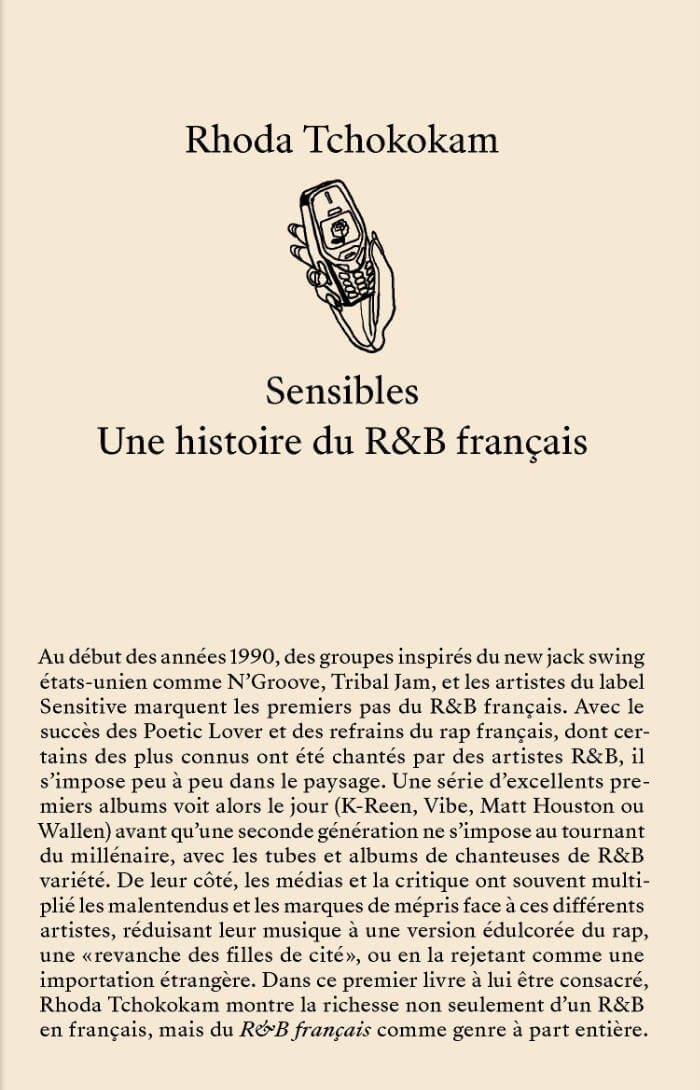
Sensibles : une histoire du R&B français de Rhoda Tchokokam
Au début des années 1990, des groupes inspirés du new jack swing états-unien comme N’Groove, Tribal Jam, et les artistes du label Sensitive marquent les premiers pas du R&B français.
Avec le succès des Poetic Lover et des refrains du rap français, dont certains des plus connus ont été chantés par des artistes R&B, il s’impose peu à peu dans le paysage. Une série d’excellents premiers albums voit alors le jour (K-Reen, Vibe, Matt Houston ou Wallen) avant qu’une seconde génération ne s’impose au tournant du millénaire, avec les tubes et albums de chanteuses de R&B variété. De leur côté, les médias et la critique ont souvent multiplié les malentendus et les marques de mépris face à ces différents artistes, réduisant leur musique à une version édulcorée du rap, une «revanche des filles de cité», ou en la rejetant comme une importation étrangère. Dans ce premier livre à lui être consacré, Rhoda Tchokokam montre la richesse non seulement d’un R&B en français, mais du R&B français comme genre à part entière.
En s’appuyant sur la parole des principales actrices et acteurs de ce mouvement, Rhoda Tchokokam en propose une histoire culturelle ambitieuse. Sa passion pour les chansons de R&B français croise en permanence l’analyse de leur dimension politique : elle examine aussi bien leur manière d’assumer la sexualité que leurs injonctions à la pudeur, les stratégies de formatage commercial que l’affirmation d’une sororité noire dans les clips.
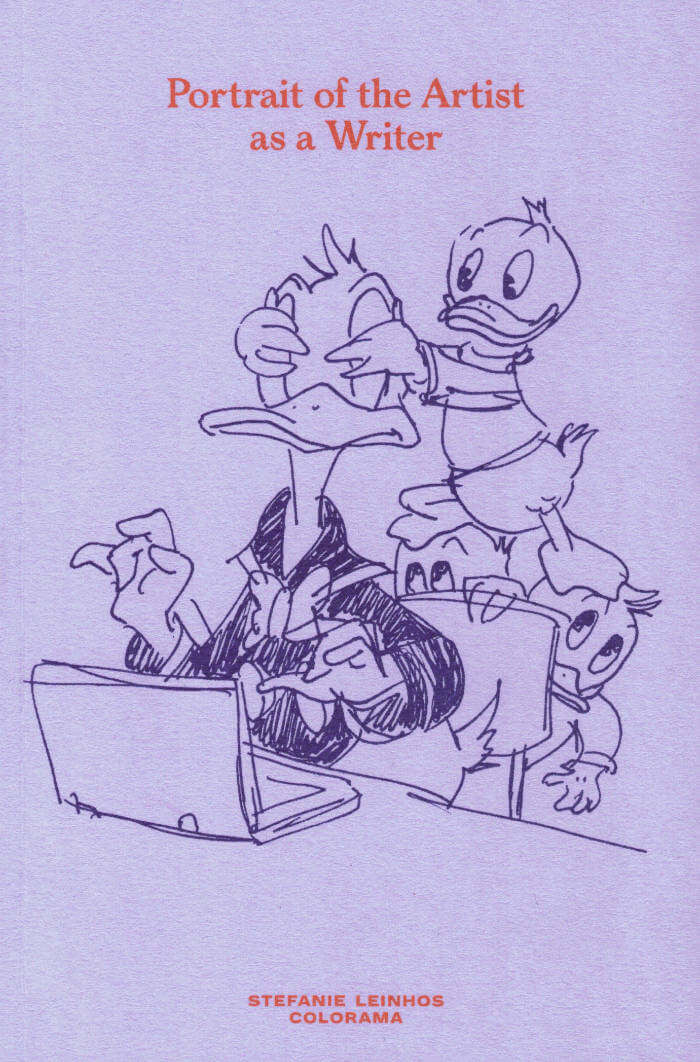
Portrait of the Artist as a Writer
"Portrait of the Artist as a Writer" is a collection of short stories, quotes and drawings about dinosaurs, gay lesbians and how to lose a joke at the lake.
Risoprinted in pumpkin and purple, perfect binding with glue, first edition of 300, Berlin 2022.

Gravity Road: A Rollercoaster Reader
Jesse Darling, Heinrich Dietz and 2 more
Constructed in Pennsylvania in 1827, Gravity Road was a precursor to the modern roller coaster; a sloping stretch of railroad used to cart coal out of mines. With passenger rides on offer soon afterwards, the rapid descent became an attraction and the technology was appropriated for thrill rides in amusement parks.
Jesse Darling’s sculptures, drawings and installations address the fallibility, fungibility and mortality of living beings, systems of government, ideologies and technologies – nothing is too big to fail. For his exhibition at Kunstverein Freiburg in 2020, Darling created a sculpture of a dysfunctional roller coaster, broken down to a child-like scale, becoming an anti-monument to a modernity that celebrates progress, acceleration and mastery and produces violence.
Exploring the entangled history of labour, leisure, extraction and entertainment, Gravity Road: A Rollercoaster Reader was commissioned in response to Darling’s 2020 exhibition, bringing together new texts by artist and Darling-collaborator Joe Highton and writer Sabrina Tarasoff along with a correspondence between Darling and the Kunstverein’s director Heinrich Dietz.
FEATURING TEXTS BY:
Jesse Darling
Heinrich Dietz
Joe Highton
Sabrina Tarasoff